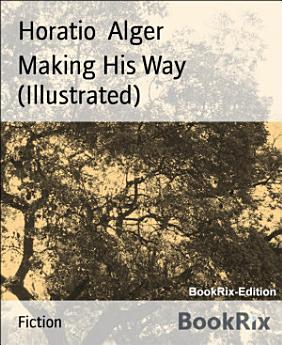Making His Way (Illustrated)
апр 2014. · BookRix
E-knjiga
177
Stranica
family_home
Ispunjava uslove
info
reportOcene i recenzije nisu verifikovane Saznajte više
O ovoj e-knjizi
Two boys were walking in the campus of the Bridgeville Academy. They were apparently of about the same age-somewhere from fifteen to sixteen-but there was a considerable difference in their attire.
Herbert Grant was neatly but coarsely dressed, and his shoes were of cowhide, but his face indicated a frank, sincere nature, and was expressive of intelligence.
His companion was dressed in a suit of fine cloth, his linen was of the finest, his shoes were calfskin, and he had the indefinable air of a boy who had been reared in luxury.
He had not the broad, open face of his friend-for the two boys were close friends-but his features were finely chiseled, indicating a share of pride, and a bold, self-reliant nature.
He, too, was an attractive boy, and in spite of his pride possessed a warm, affectionate heart and sterling qualities, likely to endear him to those who could read and understand him.
Horatio Alger, Jr. (January 13, 1832 – July 18, 1899) was a prolific 19th-century American author, best known for his many juvenile novels about impoverished boys and their rise from humble backgrounds to lives of middle-class security and comfort through hard work, determination, courage, and honesty. His writings were characterized by the "rags-to-riches" narrative, which had a formative effect on America during the Gilded Age. Alger's name is often invoked incorrectly as though he himself rose from rags to riches, but that arc applied to his characters, not to the author. Essentially, all of Alger's novels share the same theme: a young boy struggles through hard work to escape poverty. Critics, however, are quick to point out that it is not the hard work itself that rescues the boy from his fate, but rather some extraordinary act of bravery or honesty, which brings him into contact with a wealthy elder gentleman, who takes the boy in as a ward. The boy might return a large sum of money that was lost or rescue someone from an overturned carriage, bringing the boy—and his plight—to the attention of some wealthy individual. It has been suggested that this reflects Alger's own patronizing attitude to the boys he tried to help.
Herbert Grant was neatly but coarsely dressed, and his shoes were of cowhide, but his face indicated a frank, sincere nature, and was expressive of intelligence.
His companion was dressed in a suit of fine cloth, his linen was of the finest, his shoes were calfskin, and he had the indefinable air of a boy who had been reared in luxury.
He had not the broad, open face of his friend-for the two boys were close friends-but his features were finely chiseled, indicating a share of pride, and a bold, self-reliant nature.
He, too, was an attractive boy, and in spite of his pride possessed a warm, affectionate heart and sterling qualities, likely to endear him to those who could read and understand him.
Horatio Alger, Jr. (January 13, 1832 – July 18, 1899) was a prolific 19th-century American author, best known for his many juvenile novels about impoverished boys and their rise from humble backgrounds to lives of middle-class security and comfort through hard work, determination, courage, and honesty. His writings were characterized by the "rags-to-riches" narrative, which had a formative effect on America during the Gilded Age. Alger's name is often invoked incorrectly as though he himself rose from rags to riches, but that arc applied to his characters, not to the author. Essentially, all of Alger's novels share the same theme: a young boy struggles through hard work to escape poverty. Critics, however, are quick to point out that it is not the hard work itself that rescues the boy from his fate, but rather some extraordinary act of bravery or honesty, which brings him into contact with a wealthy elder gentleman, who takes the boy in as a ward. The boy might return a large sum of money that was lost or rescue someone from an overturned carriage, bringing the boy—and his plight—to the attention of some wealthy individual. It has been suggested that this reflects Alger's own patronizing attitude to the boys he tried to help.
Ocenite ovu e-knjigu
Javite nam svoje mišljenje.
Informacije o čitanju
Pametni telefoni i tableti
Instalirajte aplikaciju Google Play knjige za Android i iPad/iPhone. Automatski se sinhronizuje sa nalogom i omogućava vam da čitate onlajn i oflajn gde god da se nalazite.
Laptopovi i računari
Možete da slušate audio-knjige kupljene na Google Play-u pomoću veb-pregledača na računaru.
E-čitači i drugi uređaji
Da biste čitali na uređajima koje koriste e-mastilo, kao što su Kobo e-čitači, treba da preuzmete fajl i prenesete ga na uređaj. Pratite detaljna uputstva iz centra za pomoć da biste preneli fajlove u podržane e-čitače.








